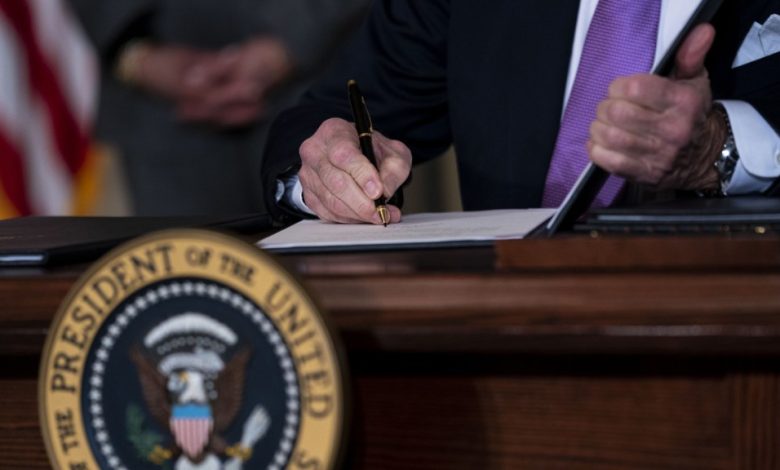Biden Issues Executive Order on Further Advancing Racial Equity and Support for Underserved Communities


ABOVE: U.S. President Joe Biden signs executives orders related to his racial equity agenda in the State Dining Room of the White House on January 26, 2021 in Washington, DC. President Biden signed executive actions Tuesday on housing and justice reforms, including a directive to the Department of Justice to end its use of private prisons. (Photo by Doug Mills-Pool/Getty Images)
President Joe Biden has told the government to do more to fix the problem of racial inequality.
On Thursday, Feb. 16, Biden signed an executive order for the federal government to do more to promote racial equality and help underserved communities.
When signing the order, the president pointed out what his administration had already done.
Biden said, “My administration’s commitment to fairness has led to better decisions and more fair results.”
“We have delivered the most equitable economic recovery in memory, and, driven by the expanded Child Tax Credit, we cut child poverty to its lowest rate on record in 2021, including record low Black, Latino, Native American, and rural child poverty.”
He said the economy had created nearly 11 million jobs, and the federal government has brought down unemployment nationwide – particularly for Black and Latino workers, whose unemployment rates are near 50-year lows.
Administration officials noted continued racial disparities in wealth, housing, crime, and education.
Biden has said those disparities reflect decades of discriminatory policies.
On his first day in office two years ago, the president signed an executive order recognizing long-standing disparities and pledging that the government would remedy them.
The new executive order comes as African Americans and others observe Black History Month.
It amends the previous order, making the initial review he requested in January 2021 an annual requirement for federal agencies.
The reviews aim to increase access to federal programs, services, and activities for disadvantaged communities.
“These transformative achievements have advanced the work of building a more equitable nation,” Biden asserted. “Yet, members of underserved communities – many of whom have endured generations of discrimination and disinvestment – still confront significant barriers to realizing the full promise of our great nation, and the federal government has a responsibility to remove these barriers.”
Biden continued:
“It is imperative to reject the narrow, cramped view of American opportunity as a zero-sum game. When any person or community is denied freedom, dignity, and prosperity, our entire nation is held back. But when we lift each other up, we are all lifted up.”
The president declared that his administration must take additional action across the federal government – in collaboration with civil society, the private sector, and State and local government – to continue the work begun with his initial order to combat discrimination and advance equal opportunity, including by redressing unfair disparities and removing barriers to Government programs and services.
Biden insisted that racial equality and helping communities that don’t get enough help are not one-time projects.
The new order also directs federal agencies to have equity teams and name senior leaders who would be accountable for increasing equity and addressing bias.
Biden is “doubling down,” according to Chiraag Bains, the president’s special assistant for racial justice and equity, on the promise he made on his first day in office “to put fairness at the center of how this government runs.”
The order recognizes that attaining equity is not a one- or two-year undertaking, and it makes official Biden’s promise that government be open and accessible to all.
Bains referred to it as a “generational commitment.”
There is room for improvement in how often and how effectively federal agencies partner with communities affected by systemic discrimination, Bains added.
Moreover, the new order formally establishes the president’s aim of increasing federal procurement expenditures going to small and disadvantaged enterprises by 50% by the year 2025.
Under the order, agencies must also focus on new civil rights threats, such as discrimination in automated technology and access for people with disabilities and those who speak languages other than English.
It also includes a push to improve collection, transparency, and data analysis to help improve equity.
“By redoubling our efforts, the federal government can help bridge the gap between the world we see and the future we seek,” Biden stated.
The post Biden Issues Executive Order on Further Advancing Racial Equity and Support for Underserved Communities appeared first on Houston Forward Times.



